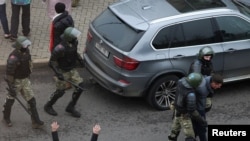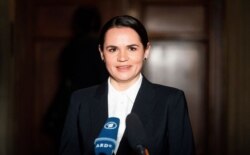Belarusian police have detained scores of protesters who were demanding the resignation of Alexander Lukashenko and a new presidential election following a disputed vote in August.
Black-clad security forces used tear gas and stun grenades to disperse thousands of demonstrators in the capital, Minsk, on Sunday.
The Vyasna human rights group said at least 179 protesters were detained in Minsk and other cities, including in Homel, Hrodna, and Mogilev.
Demonstrators in Minsk carried the banned white-red-white flags that have become a symbol of the political opposition in Belarus and chanted slogans like, “Lukashenko! Tribunal!” and “Love live Belarus!”
Mobile Internet was down and several subway stations in central Minsk were closed.
Opposition leader Svetlana Tikhanouskaya, who has said the vote was rigged in Lukashenko's favor and considers herself the rightful winner, described the crackdown on protesters on November 15 with "gas, grenades and firearms" as "devastating" and called for international support for the demonstrators.
"We ask our allies to stand up for the Belarusian people and human rights. We need a humanitarian corridor for the injured, support for the media, international investigation of crimes," she wrote on Twitter.
Tikhanouskaya left Belarus for Lithuania after the vote amid threats to her and her family.
Lukashenko, who has ruled Belarus for 26 years, has faced almost daily protests calling for his resignation since a presidential election on August 9 that the opposition says was rigged and which the West has refused to accept.
Russia, meanwhile, has supported Lukashenko in the ongoing standoff.
Lukashenko on November 13 vowed not to hand over power and slammed his political opponents and demonstrators.
Lukashenko said his country should integrate with Russia and Moscow-led organizations to avoid what he called "color revolutions" -- a term often used to describe pro-Western political upheavals.
His remarks came as the European Union again condemned violent crackdowns against Belarusian protesters and threatened to impose more sanctions on Minsk following the death of a 31-year-old Belarusian man on November 12 who is believed to have been badly beaten by masked security forces.
Several protesters have been killed and thousands of people arrested since authorities declared Lukashenko the landslide winner of the vote.
There have also been credible reports of torture during a widening security crackdown.
Most of the country's opposition have been arrested or forced to leave the country.





